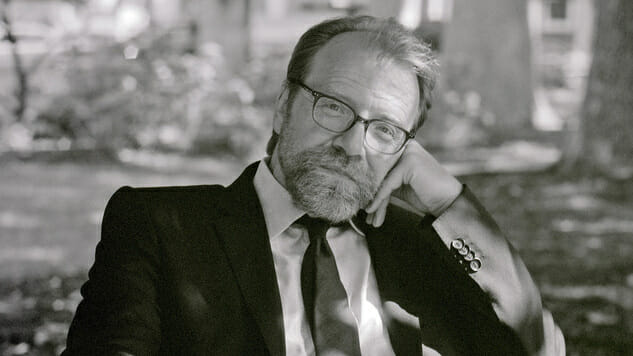George Saunders Talks History and Ghosts in Lincoln in the Bardo
Author photo by David Crosby
As the ancients tell us, we can never be too rich, too thin or have too much George Saunders. I just invented the third part of that saying, but it ought to be true. Calling Saunders the greatest living short story writer in America is like naming the Moon the best natural satellite of Earth: Who else could it be?
After decades of brilliant work in the brief yarn vein, Saunders recently released his first novel, Lincoln in the Bardo. Set in 1862, the book features the 16th President and a Washington graveyard full of ghosts—including the president’s recently departed son, Willie Lincoln. Each specter converses in such a unique voice that Penguin Random House cast 166 people in the audiobook dramatization, including Nick Offerman, David Sedaris and Carrie Brownstein.
The novel has wowed pretty much every critic, book pundit and think piece originator within the greater literary cosmos of 2017. I could wax endlessly about Saunders, but that would take away from the main attraction: an interview I did with him over the phone, where the author spoke with warmth, wit and no small amount of charm.
(This interview has been edited for length and clarity.)
![]()
Paste: There are a lot of books about after the Civil War—The Brown Decades, Lincoln at Gettysburg—where the authors talk about how people didn’t know what to do and were grasping towards something. They couldn’t square the death that existed in the world with the Darwinian mechanistic cosmos, and that’s where all the spiritualism came from. How is that figured in your thinking?
Saunders: Well, what’s that book? The Republic of Suffering, is that Drew [Gilpin Faust]?
Paste: Yes.
Saunders: Yes. Yes. For most of the Civil War, people had this idea of “the good death.” You were surrounded by family. You were all right with God. You weren’t in pain. You faded away with a last grateful smile … and then suddenly, all these families are finding out that their son has been blown apart on a battlefield, that they can’t actually find the body, and that maybe he was terrified at the end and all that. So the one thing that I, when I was reading about Lincoln, the thing that really intrigued me was that he was not naturally a Christian. It seemed like he was one of those politicians who kind of talk the talk when necessary, but at heart a lot of people who knew him said he didn’t really believe in Christ or in God necessarily.
But then in those last few years, you can see him enacting a form of what you just described. This reality was so horrific and so out of control. And it ran so contrary to any kind of controlling narrative that people had at that time. And I think it drove him into a place of saying, “Okay, let me assume there’s such a thing as God even though I can’t understand what God might be.” And then by looking at the world, and looking at the war, trying to figure out what the divine will might be.
He just wrote down a sort of syllogism on a paper about slavery, and they found it after his death. So I think the thing was, he was really saying, “Okay, I’m going to pretend there is a God, and I’m going to watch and try to see what God wants me to do.” Operating in that vacuum that you just described, the reality was going so fast and so insanely that he kind of just threw up his hands. And what really moves me about him is, in that moment, he came to conclusions that we’re still trying to live up to today about equality and about the will of God being expressed through blood basically. He said at one point something like, “Providence could end this war and slavery if it wished to, but it appears not to wish to. So therefore, to serve God, we must see these things through to the end.” Which was pretty apocalyptic.
-

-

-

-

-

-

-

-

-

-

-

-

-

-

-

-

-

-

-

-

-

-

-

-

-

-

-

-

-

-

-

-

-

-

-

-

-

-

-

-

 Paste: There’s this part in your book that I ran up against. I didn’t think you would have Lincoln in the graveyard saying—before I read it, I didn’t think you’d have him saying like, “This graveyard cannot exist half alive and half dead,” or anything like that.
Paste: There’s this part in your book that I ran up against. I didn’t think you would have Lincoln in the graveyard saying—before I read it, I didn’t think you’d have him saying like, “This graveyard cannot exist half alive and half dead,” or anything like that. 






































